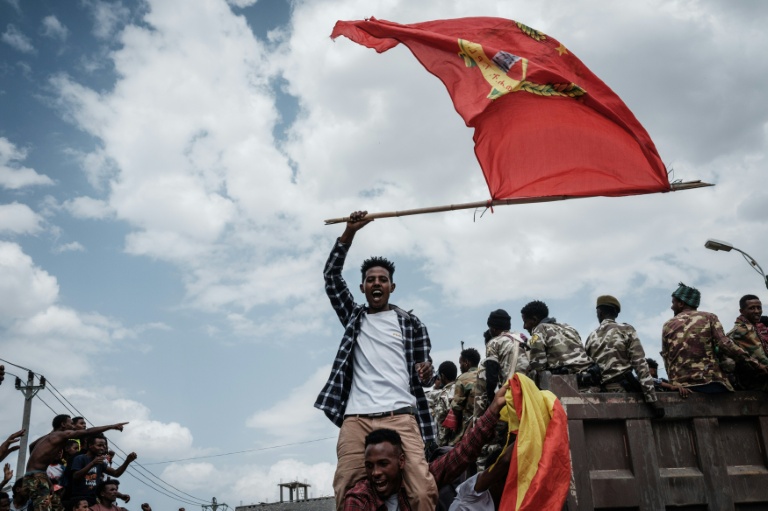World
Tigray Forces Attack Afar Region, Escalating Ethiopia’s Conflict

The Afar region of Ethiopia has reported an attack by forces from the neighboring Tigray region, marking a significant escalation in ongoing internal conflicts within the nation. According to the Afar regional administration, the Tigray People’s Liberation Front (TPLF) seized control of six villages and bombarded civilians with mortars and heavy artillery on Wednesday, raising alarms about the stability of the region.
The recent skirmish is a continuation of the tensions that have persisted since a devastating civil war between Tigray rebels and the central government, which lasted from 2020 to 2022. This conflict resulted in an estimated 600,000 deaths, and relations between Tigray and the federal government have remained strained. As noted by the Afar authorities, Tigrayan forces targeted areas within the Megale district and opened fire on civilian pastoralists. They warned that they would take necessary defensive actions if such attacks continued.
While the TPLF has not yet responded to requests for comment, a source within a humanitarian agency confirmed that fighting occurred and noted that it concluded by late Wednesday. The source, who requested anonymity, stated that many people were displaced as a result of the attacks but did not report any casualties.
Escalating Tensions and Political Dynamics
The underlying reasons for this latest outbreak of violence remain unclear. Kjetil Tronvoll, a professor at Oslo New University College and an expert on the region, indicated that Ethiopia has been on a “path to war” for several months, with growing divisions between Tigray and the federal government. Historically, the TPLF dominated Ethiopian politics from 1991 until 2018 when Prime Minister Abiy Ahmed assumed power, sidelining the group politically.
In May 2023, the Ethiopian Electoral Commission officially banned the TPLF from political activities, citing a technicality that further strained relations. Last month, the federal government accused the TPLF of forming ties with Eritrea and preparing for military action against Ethiopia, a claim that was communicated to the United Nations.
Additionally, the federal government suspended the disbursement of more than 2 billion birrs ($13.1 million) to Tigray, citing concerns that funds were being diverted for military purposes. Prime Minister Abiy Ahmed expressed his worries in parliament, stating, “Unfortunately, much of the budget allocated to Tigray is being diverted for military purposes, which harms the region and leaves ordinary people suffering.”
Humanitarian Impact and Ongoing Displacement
The Tigray region, which is home to approximately 6 million people, has been severely impacted by the civil war, with around 1 million individuals still displaced from the hostilities that erupted between 2020 and 2022. The ongoing violence exacerbates the humanitarian crisis, as the region struggles to provide for its residents amidst the conflict.
As the situation evolves, the international community continues to monitor the developments in Ethiopia closely. The potential for further escalation remains high, and the need for diplomatic engagement is critical to prevent a return to widespread violence.
In summary, the recent attacks in the Afar region highlight the fragile state of peace in Ethiopia and the urgent need for resolution amidst deepening internal divisions.
-

 Science3 months ago
Science3 months agoToyoake City Proposes Daily Two-Hour Smartphone Use Limit
-

 Health3 months ago
Health3 months agoB.C. Review Reveals Urgent Need for Rare-Disease Drug Reforms
-

 Top Stories3 months ago
Top Stories3 months agoPedestrian Fatally Injured in Esquimalt Collision on August 14
-

 Technology3 months ago
Technology3 months agoDark Adventure Game “Bye Sweet Carole” Set for October Release
-

 World3 months ago
World3 months agoJimmy Lai’s Defense Challenges Charges Under National Security Law
-

 Lifestyle3 months ago
Lifestyle3 months agoVictoria’s Pop-Up Shop Shines Light on B.C.’s Wolf Cull
-

 Technology3 months ago
Technology3 months agoKonami Revives Iconic Metal Gear Solid Delta Ahead of Release
-

 Technology3 months ago
Technology3 months agoApple Expands Self-Service Repair Program to Canada
-

 Technology3 months ago
Technology3 months agoSnapmaker U1 Color 3D Printer Redefines Speed and Sustainability
-

 Technology3 months ago
Technology3 months agoAION Folding Knife: Redefining EDC Design with Premium Materials
-

 Technology3 months ago
Technology3 months agoSolve Today’s Wordle Challenge: Hints and Answer for August 19
-

 Business3 months ago
Business3 months agoGordon Murray Automotive Unveils S1 LM and Le Mans GTR at Monterey









